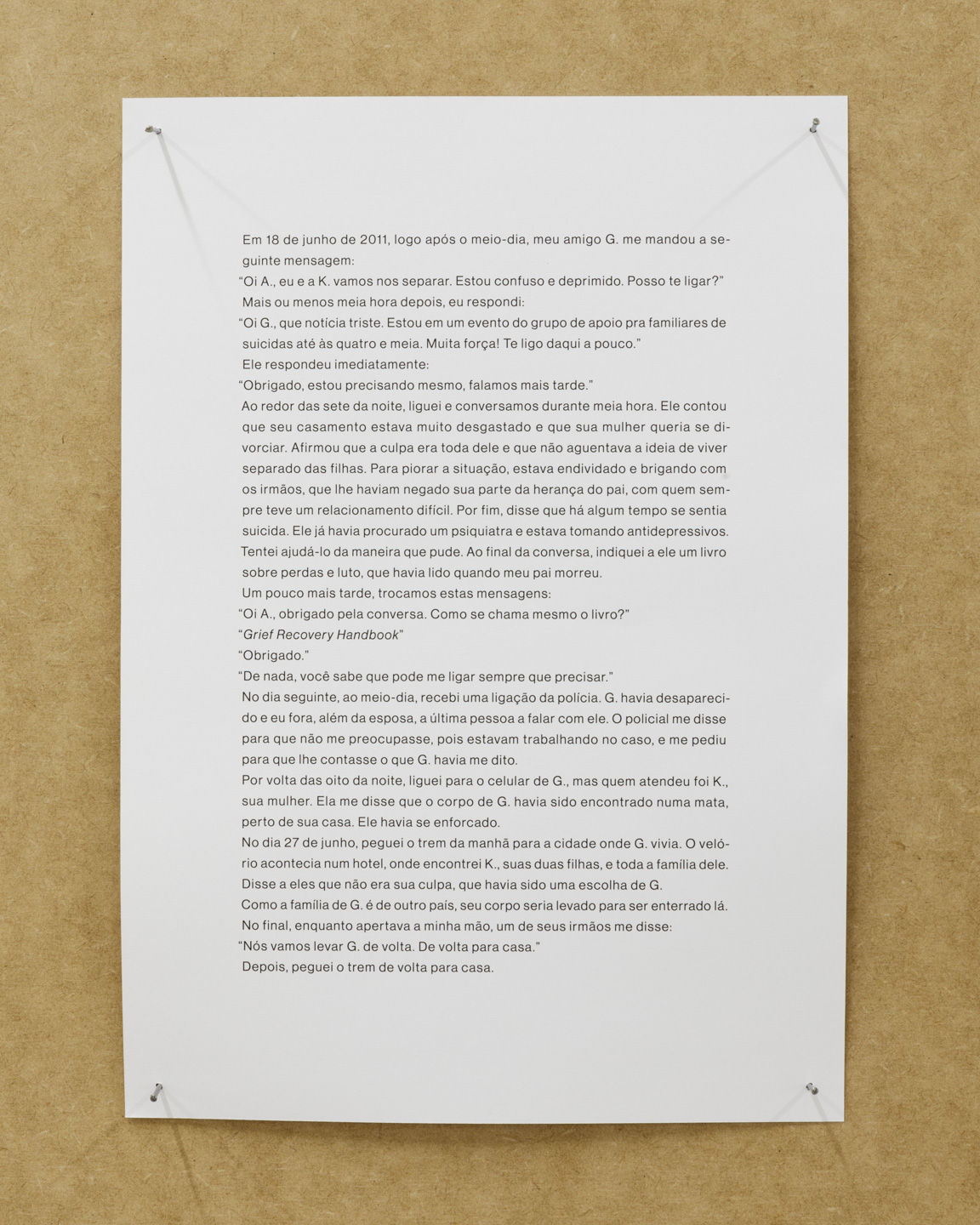Em 18 de junho de 2011, logo após o meio-dia, meu amigo G. me mandou a seguinte mensagem:
“Oi A., eu e a K. vamos nos separar. Estou confuso e deprimido. Posso te ligar?”
Mais ou menos meia hora depois, eu respondi:
“Oi G., que notícia triste. Estou em um evento do grupo de apoio pra familiares de suicidas até às quatro e meia. Muita força! Te ligo daqui a pouco.”
Ele respondeu imediatamente:
“Obrigado, estou precisando mesmo, falamos mais tarde.”
Ao redor das sete da noite, liguei e conversamos durante meia hora. Ele contou que seu casamento estava muito desgastado e que sua mulher queria se divorciar. Afirmou que a culpa era toda dele e que não aguentava a ideia de viver separado das filhas. Para piorar a situação, estava endividado e brigando com os irmãos, que lhe haviam negado sua parte da herança do pai, com quem sempre teve um relacionamento difícil. Por fim, disse que há algum tempo se sentia suicida. Ele já havia procurado um psiquiatra e estava tomando antidepressivos. Tentei ajudá-lo da maneira que pude. Ao final da conversa, indiquei a ele um livro sobre perdas e luto, que havia lido quando meu pai morreu.
Um pouco mais tarde, trocamos estas mensagens:
“Oi A., obrigado pela conversa. Como se chama mesmo o livro?”
“Grief Recovery Handbook”
“Obrigado.”
“De nada, você sabe que pode me ligar sempre que precisar.”
No dia seguinte, ao meio-dia, recebi uma ligação da polícia. G. havia desaparecido e eu fora, além da esposa, a última pessoa a falar com ele. O policial me disse para que não me preocupasse, pois estavam trabalhando no caso, e me pediu para que lhe contasse o que G. havia me dito.
Por volta das oito da noite, liguei para o celular de G., mas quem atendeu foi K., sua mulher. Ela me disse que o corpo de G. havia sido encontrado numa mata, perto de sua casa. Ele havia se enforcado.
No dia 27 de junho, peguei o trem da manhã para a cidade onde G. vivia. O velório acontecia num hotel, onde encontrei K., suas duas filhas, e toda a família dele. Disse a eles que não era sua culpa, que havia sido uma escolha de G.
Como a família de G. é de outro país, seu corpo seria levado para ser enterrado lá. No final, enquanto apertava a minha mão, um de seus irmãos me disse:
“Nós vamos levar G. de volta. De volta para casa.”
Depois, peguei o trem de volta para casa.
On the 18th of June 2011, just after midday, my friend G. sent me the following text:
“Hi A., me and K. have split up, I’m in a world of pain, doubt, confusion and uncertainty. What time is a good time to call?”
Around half an hour later I texted him back:
“Hi G., I am so sorry to hear that. I am on a support day in the suicide bereavement group until 4:30. I’ll call you after. Be strong my friend.”
He replied immediately:
“Thanks man, I need some support, talk later.”
I called him around 7:00 pm and we spoke for half an hour. He told that his marriage was at a breaking point and that his wife wanted a divorce. He said that it was all his fault, and that he couldn’t stand the idea of living apart from his daughters. To make things worse, he was in debt and fighting his brothers who had denied him his part in his dad’s inheritance, with whom he’d always had a difficult relationship. In the end, he said he’d been feeling suicidal for a while. He had sought help, had seen a doctor and was on anti-depressants. I tried to help him the best I could. I recommended that he read a book on grief that I had read when my father died.
After, we exchanged these texts:
“Hi A., thanks for the chat. Was that book called grief recovery something?”
“Grief Recovery Handbook.”
“Thanks.”
“No worries. Any time you need.”
The next day, at noon, I got a call from the police. G. had gone missing that night. They told me that I was the last person, apart from his partner, to speak to him. The policeman told me not to worry as they were in the case, and asked what he had told me.
Around 8:00 pm I called G.’s mobile and K. answered it. She told me his body had been found in some woods near home. G. had hanged himself.
On the 27th of June I took a morning train to the town G. lived in. The wake was happening in a hotel where I met K., their two girls and G.’s family. I told them that it wasn’t their fault, it had been G.’s choice.
As G.’s family is from another country, they were taking his body to be buried there. At the end, whilst shaking my hand, one of his brothers said:
“We are taking G. back. Taking him back home.”
Afterwards, I took the train back home.



